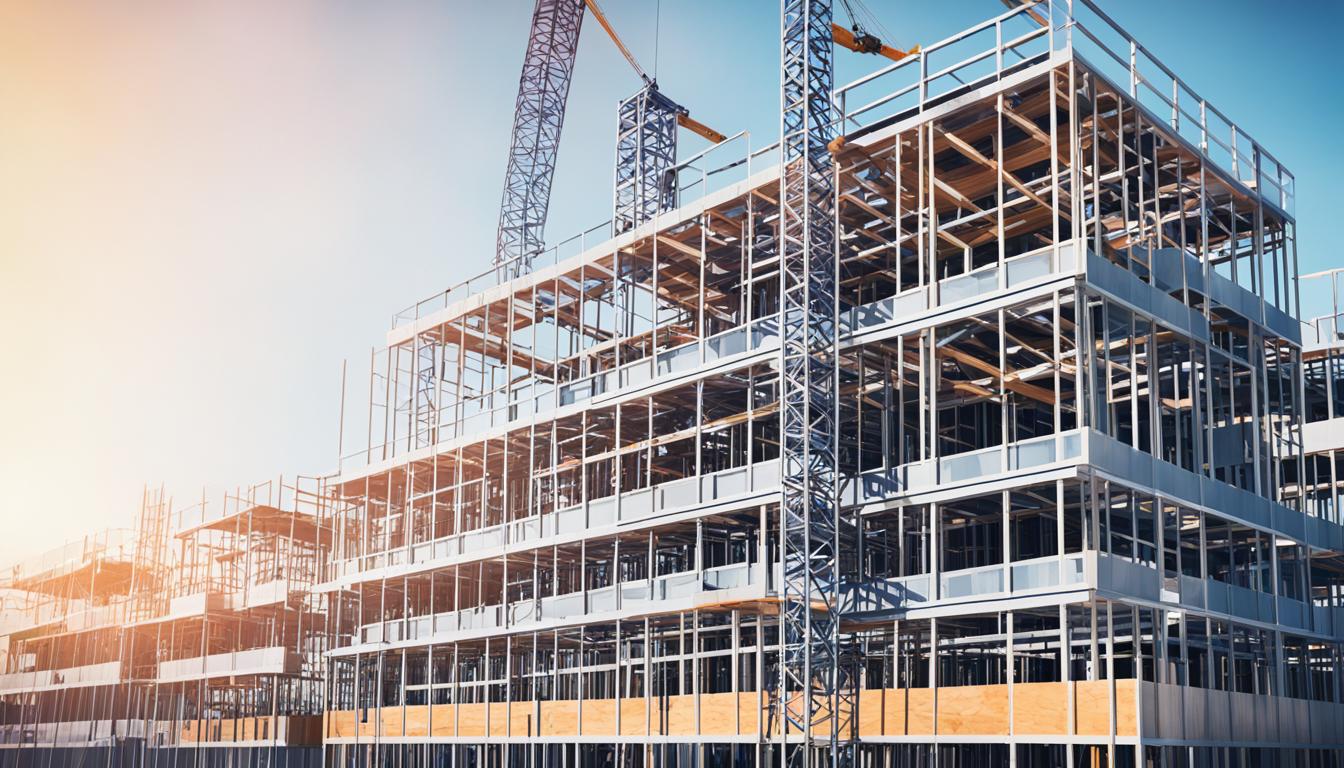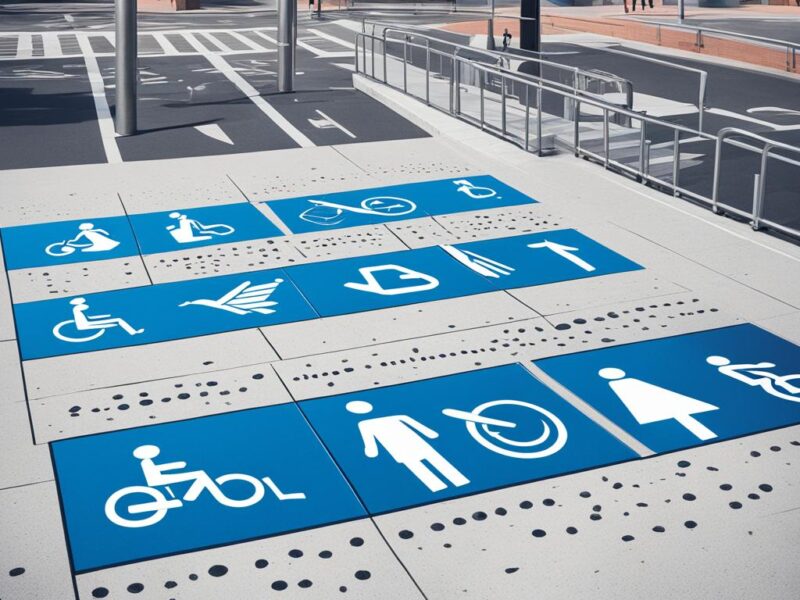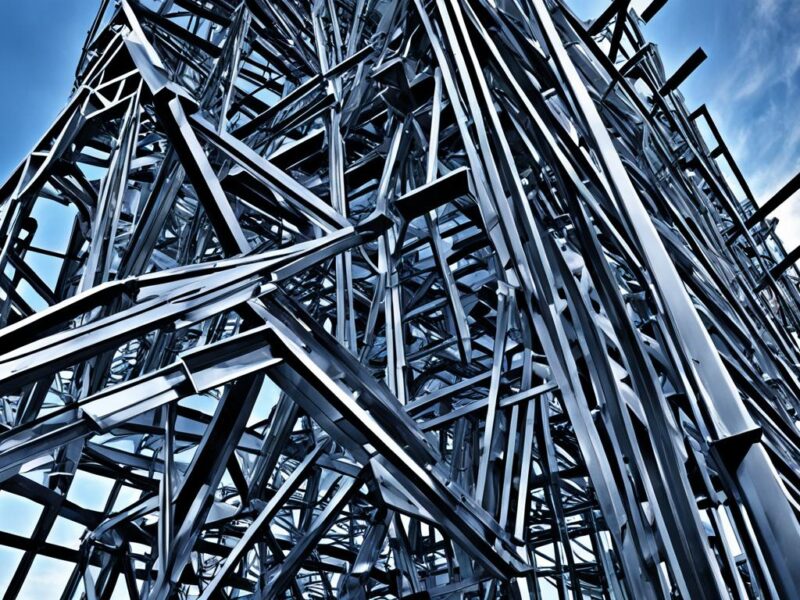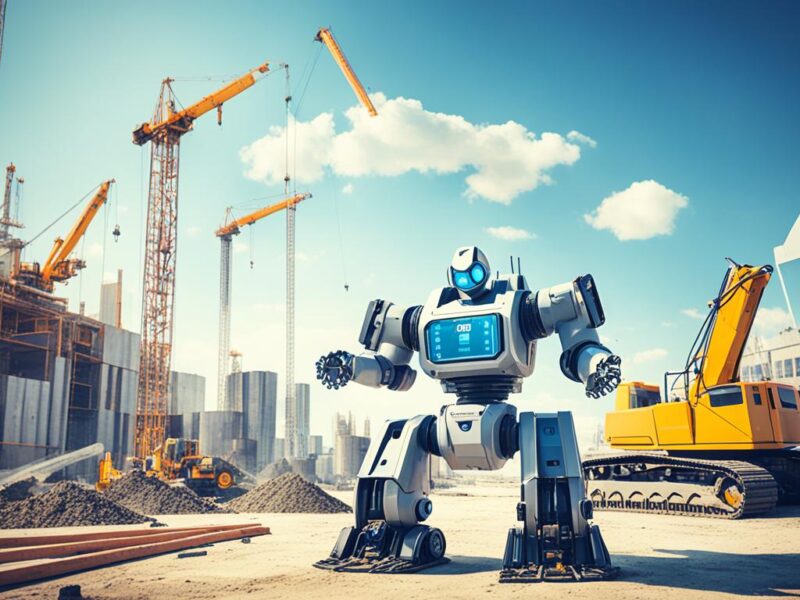
The Impact of Modular Construction on Project Management Practices
Modular construction has revolutionized the way projects are managed, bringing efficiency and streamlining processes. This innovative method involves the prefabrication of building components off-site in a controlled factory environment, leading to faster project completion times and cost-effectiveness.
Project managers are increasingly adopting modular construction as it offers several advantages, including enhanced quality control, design flexibility, and the integration of advanced technologies. With its ability to accelerate project timelines and improve overall project performance, modular construction is transforming project management practices.
Key Takeaways:
- Modular construction offers increased efficiency and streamlined processes in project management.
- Prefabricating building components off-site reduces project timelines by up to 50%.
- Modular construction enhances quality control and design flexibility.
- It provides cost savings of up to 20% compared to traditional construction methods.
- Modular construction improves safety and sustainability in construction projects.
Understanding Modular Construction and its Advantages
Modular construction has been transforming the way we build structures, offering numerous advantages over traditional construction methods. This approach involves the manufacturing of building components in a controlled factory environment, which are then transported to the construction site for assembly. The prefabrication and off-site construction process brings several benefits that contribute to increased efficiency, enhanced quality control, cost savings, sustainability, design flexibility, and the integration of advanced technologies.
Modular construction is gaining popularity across the construction industry due to its ability to accelerate project timelines and improve overall project performance. Let’s explore the advantages in more detail:
Increased Efficiency:
By manufacturing components off-site, modular construction eliminates the need for on-site construction activities such as cutting, measuring, and fitting. This streamlined process allows project teams to work more efficiently, reducing construction time and improving project scheduling.
Enhanced Quality Control:
The controlled factory environment in modular construction ensures consistent quality in the building components. Precise measurements, standardized processes, and rigorous quality checks minimize human error and result in a higher standard of construction.
Cost Savings:
Modular construction offers cost savings compared to traditional construction methods. By optimizing resource management and reducing on-site labor costs, project budgets can be significantly reduced. Additionally, the off-site construction process minimizes material waste, further contributing to cost savings.
Sustainability:
The modular construction process aligns with sustainability goals by reducing waste production and optimizing material usage. With off-site manufacturing, material waste is minimized, and construction sites experience reduced environmental impact. The integration of energy-efficient technologies also enhances sustainability efforts.
Design Flexibility:
Modular construction allows for greater design flexibility, enabling creative architectural solutions. The modular components can be customized to accommodate various designs and building configurations, ensuring unique and innovative structures.
Integration of Advanced Technologies:
Modular construction is well-suited for the integration of advanced technologies. Building Information Modeling (BIM), automation, and smart building systems can be seamlessly incorporated into the modular components, enhancing efficiency, functionality, and sustainability.
Overall, modular construction provides a multitude of advantages that enhance project management practices and improve construction outcomes. It offers increased efficiency, enhanced quality control, cost savings, sustainability, design flexibility, and the integration of advanced technologies. Its ability to accelerate project timelines makes modular construction a compelling choice for project managers seeking improved performance and streamlined project delivery.
The Impact of Modular Construction on Costs
Modular construction has the potential to significantly impact project costs. According to research, modular construction can lead to cost savings of up to 20%. These savings can be attributed to factors such as reduced on-site labor costs, avoidance of redesigns, and optimized resource management. However, it is important to note that logistics and factory costs can also contribute to cost increases, so careful planning and consideration are required when implementing modular construction.
To better understand the cost implications of modular construction, let’s take a closer look at the key factors influencing project costs:
- Reduced On-site Labor Costs: With modular construction, a significant portion of the construction process is completed off-site in factory-controlled environments. This reduces the need for extensive on-site labor, resulting in cost savings.
- Avoidance of Redesigns: Prefabricating modules in a controlled environment allows for greater precision and accuracy in construction, minimizing the need for costly redesigns due to errors or discrepancies.
- Optimized Resource Management: Modular construction enables efficient resource management by optimizing material usage, reducing waste, and minimizing delays caused by weather conditions. This streamlined approach contributes to overall cost savings.
While modular construction offers significant cost-saving opportunities, it is essential to carefully evaluate and manage potential cost increases associated with logistics and factory costs. Thorough planning and collaboration with experienced modular construction providers are crucial for mitigating these potential cost escalations and maximizing the benefits of modular construction.
Accelerating Project Timelines through Modular Construction
Modular construction offers a significant advantage in accelerating project timelines, resulting in substantial time savings for construction projects. By manufacturing building components off-site in a controlled factory environment, construction can progress simultaneously on-site, effectively reducing project timelines by up to 50%. This parallel construction process enables faster project completion, allowing project teams to meet critical deadlines and deliver results more efficiently.
The streamlined nature of modular construction minimizes delays caused by weather conditions, logistical challenges, and time-consuming on-site activities. With modular construction, project schedules can be optimized, ensuring a smoother and more efficient workflow from start to finish. The ability to work on different stages of construction concurrently promotes time savings and eliminates the need for sequential construction processes, resulting in accelerated project timelines.
Modular construction also improves project management practices by providing better control over project timelines and reducing the risk of schedule delays. The controlled factory environment ensures consistent production quality and adherence to project schedules. It mitigates the factors that typically contribute to delays in traditional construction, such as weather disruptions and labor shortages. The predictability and efficiency of modular construction allow project managers to optimize resources, reduce downtime, and deliver projects on time and within budget.
“Modular construction allows for parallel on-site and off-site work, reducing overall project timelines and streamlining the construction process.”
Enhancing Efficiency and Cost Savings
One of the key drivers behind accelerated project timelines in modular construction is the innate efficiency of the process. Off-site manufacturing of building components reduces the time required for on-site assembly, enabling faster progress and minimizing disruptions. In addition, the repetitive nature of modular construction allows for the optimization of construction processes, resulting in improved productivity and time savings.

Improved Collaboration and Coordination
The modular construction process encourages better collaboration and coordination among project stakeholders. The preplanning and coordination required for off-site manufacturing of modules aligns project teams and promotes effective communication between all involved parties. This coordinated effort ensures that construction activities proceed seamlessly on-site while modules are being manufactured concurrently off-site, eliminating the need for extensive coordination during on-site construction and reducing potential conflicts or delays.
Reduced On-Site Disruptions
By shifting a significant portion of construction activities off-site, modular construction minimizes the disruptions typically associated with traditional construction. Building components are manufactured in a controlled factory environment, free from inclement weather conditions and other external factors that can impede progress and cause delays. As a result, project schedules are better protected, and the risk of delays due to unforeseen circumstances is significantly reduced.
Improving Safety and Sustainability with Modular Construction
Modular construction offers enhanced safety and sustainability compared to traditional construction methods. The factory-controlled production environments in modular construction minimize the risk of accidents and injuries, providing a safer workplace for construction workers. The controlled environment reduces exposure to hazardous conditions, such as extreme weather, and ensures that safety protocols are strictly followed. By prioritizing safety, modular construction projects create a more secure construction environment.
Furthermore, modular construction contributes to sustainability efforts in the construction industry. The optimization of material usage is a key aspect of modular construction, as it minimizes waste and promotes resource efficiency. Precise measurements and standardized processes enable accurate material requirements, reducing material waste during manufacturing. Additionally, the off-site construction approach minimizes on-site waste production, as only necessary modules are transported to the construction site.
Modular construction aligns with green building principles and supports sustainable development. Through reduced waste production and optimized resource utilization, modular construction minimizes the environmental footprint of construction projects. The sustainable practices of modular construction make it an attractive option for environmentally conscious stakeholders.
Safety Benefits of Modular Construction
“The factory-controlled production environment in modular construction ensures a higher level of safety for workers. By mitigating hazards typically associated with on-site construction, modular construction significantly reduces accidents and injuries, improving overall worker well-being.” – Anna Anderson, Construction Safety Expert
Sustainability Advantages of Modular Construction
Modular construction supports sustainable construction practices through waste reduction and efficient resource management. By optimizing material usage and minimizing waste production, modular construction projects actively contribute to sustainability goals, making them a preferred choice for environmentally conscious developers and stakeholders.
LEED Certification and Modular Construction
Modular construction aligns with the principles of Leadership in Energy and Environmental Design (LEED) certification. LEED certification is an internationally recognized symbol of sustainability achievement in the construction industry. Due to its efficient resource utilization and reduced environmental impact, modular construction projects are well-positioned to achieve LEED certification, adding further credibility and value to the sustainable aspect of these projects.
| Benefits | Traditional Construction | Modular Construction |
|---|---|---|
| Safety | Dependent on on-site conditions, weather, and manual labor | Enhanced safety due to controlled factory environment and reduced hazards |
| Sustainability | Higher on-site waste production, less optimized material usage | Optimized material usage, reduced on-site waste production |
| Environmental Impact | Significant environmental footprint due to waste and resource inefficiencies | Reduced environmental impact through waste reduction and efficient resource management |
Enhancing Quality Control in Modular Construction
Modular construction offers a unique advantage when it comes to quality control. The controlled factory environment allows for strict quality control measures to be implemented throughout the manufacturing process. This ensures that each component is produced with precision and adheres to standardized processes, minimizing the risk of human error and ensuring consistent quality in the final product.
With precise measurements and rigorous quality checks at every stage, modular construction eliminates the uncertainties that often arise in traditional on-site construction. By relying on a controlled factory setting, project teams can closely monitor and maintain the quality of the modules being manufactured.
This focus on quality control in modular construction translates to numerous benefits for project managers and stakeholders. Consistent quality in the final product means fewer issues during installation and assembly, reducing the likelihood of costly rework and delays. It also contributes to improved durability and longevity of the structure, as modules are not exposed to weather-related elements during the construction process.
Furthermore, the prefabricated nature of modular construction allows for comprehensive quality assurance testing before modules are transported to the construction site. This thorough evaluation ensures that all modules meet the required standards and specifications, providing peace of mind that the final structure will meet or exceed expectations.
By enhancing quality control measures and minimizing the potential for errors, modular construction offers a reliable approach to construction that can greatly improve project outcomes.
The Benefits of Enhanced Quality Control in Modular Construction
The implementation of robust quality control measures in modular construction has several advantages:
- Consistent quality in the final product
- Minimized risk of human error
- Reduced likelihood of costly rework and delays
- Improved durability and longevity of the structure
- Thorough quality assurance testing before installation
| Advantages of Enhanced Quality Control in Modular Construction | Description |
|---|---|
| Consistent quality in the final product | Stringent quality control measures ensure that each module meets the required standards and specifications, resulting in a consistent level of quality across all components. |
| Minimized risk of human error | Precise measurements, standardized processes, and rigorous quality checks during manufacturing minimize the risk of human error, ensuring that each module is produced with accuracy. |
| Reduced likelihood of costly rework and delays | By maintaining strict quality control throughout the manufacturing process, issues and discrepancies are addressed early on, reducing the need for costly rework and preventing delays in the project timeline. |
| Improved durability and longevity of the structure | The controlled factory environment eliminates weather-related delays and exposure to external elements, resulting in modules that are more durable and have a longer lifespan. |
| Thorough quality assurance testing before installation | Before modules are transported to the construction site, comprehensive quality assurance testing is conducted to ensure that all modules meet the required standards and specifications, providing confidence in the final product. |
By enhancing quality control measures, modular construction offers project managers and stakeholders the assurance of a high-quality end result. This not only improves the overall project outcomes but also enhances client satisfaction. It is this commitment to quality that sets modular construction apart from traditional construction methods.
Conclusion
Modular construction is revolutionizing project management practices by providing increased efficiency, cost savings, improved safety, enhanced sustainability, and enhanced quality control. This innovative approach to construction offers numerous advantages and is gaining significant attention in the industry.
As technology continues to advance, the benefits of modular construction become more apparent. With the ability to streamline processes and accelerate project timelines, modular construction is expected to become increasingly prevalent in project management practices. Its impact on the industry is significant, paving the way for improved overall project performance.
Project managers should consider incorporating modular construction into their project management strategies to harness these benefits. By leveraging the efficiency and cost savings offered by modular construction, project managers can drive success in their projects and deliver exceptional results.
FAQ
What is modular construction?
What are the advantages of modular construction?
Can modular construction save costs?
How does modular construction accelerate project timelines?
Is modular construction safer and more sustainable?
Does modular construction ensure better quality control?
How does modular construction impact project management practices?
Source Links
- https://hermosillo.com/modular-construction-its-impacts-on-costs-schedule-and-project-performance/
- https://www.mckinsey.com/capabilities/operations/our-insights/modular-construction-from-projects-to-products
- https://raymondsearchgroup.com/the-rise-of-modular-construction-advantages-and-future-implications/







